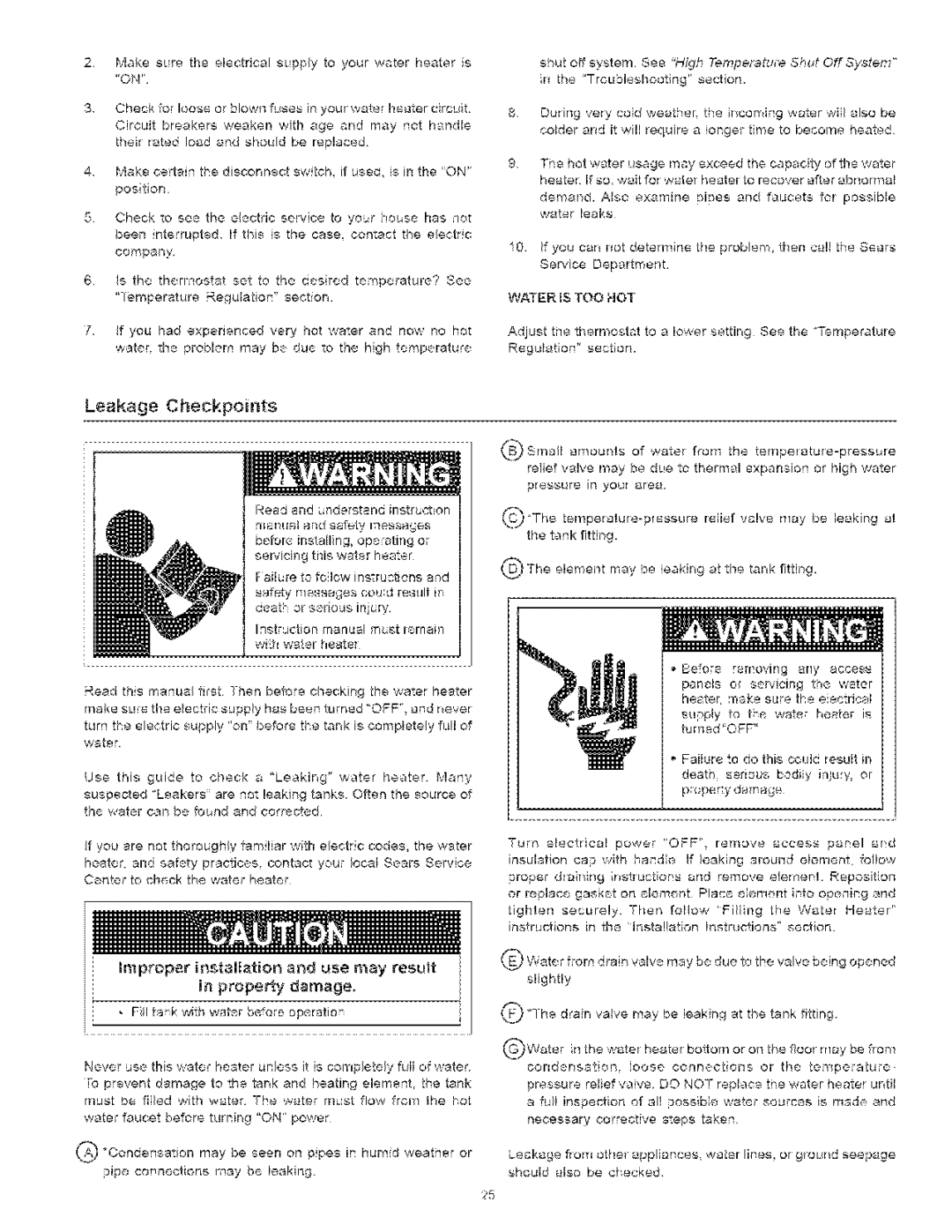
2_ Make sure the electrica! supply to your water heater is "ON"_
3.Check for loose or blown fuses in your water heater circuit. Circuit breakers weaken with age and may not handle their rated load and should be replaced.
4, Make certain the disconnect switch, if used, is in the 'ON" position.
5.Check to see the electric service to your house has not
been interrupted. If this is the case, contact the electric company.
6, Is the thermostat set to the desired temperature? See
"Temperature Regulation" section.
7, If you had experienced very hot water and now no hot water, the problem may be due to the high temperature
shut off system. See "High Temperature Shut Off System"
in the 'Troubleshooting" section.
8.During very cold weather, the incoming water will also be colder and it will require a longer time to become heated.
g, The hot water usage may exceed the capacity of the water heater. If so, wait for water heater to recover after abnormal
demand. Also examine pipes and faucets for possible water leaks.
10.If you can not determine the problem, then call the Sears Service Department.
WATER JSTOO HOT
Adjust the thermostat to a lower setting. See the 'Temperature
Regulation" section.
Leakage Checkpoints
Read and understand instruction
manual and safety messages before installing, operating or servicing this water heater
Fai0ure to follow instructions and safety messages could result in death or sedous injury.
Hnstruction manual must remain with water heater.
Read this manual first. Then before checking the water heater make sure the electric supply has been turned 'OFF", and never
turn the electric supply "on" before the tank is completely full of water.
Use this guide to check a "Leaking" water heater. Many suspected 'Leakers" are not leaking tanks. Often the source of the water can be found and corrected.
If you are not thoroughly familiar with electric codes, the water heater, and safety practices, contact your local Sears Service Center to check the water heater.
mmproper installation and use may result
in property damage.
Fill tank with water before operation
Never use this water heater unless it is completely full of water. To prevent damage to the tank and heating element, the tank must be filled with water. The water must flow from the hot water faucet before turning "ON" power.
*Condensation may be seen on pipes in humid weather or
pipe connections may be leaking.
Small amounts of water from the
relief valve may be due to thermal expansion or high water pressure in your area.
*The
The element may be leaking at the tank fitting.
Before removing any access panels or servicing the water heater, make sure the dectrical supply to the water heater is turned "OFF"
_'Failure to do this could result in death, serious bodily injury, or property damage
Turn electrical power "OFF", remove access panel and insulation cap with handle. If leaking around element, follow
proper draining instructions and remove element. Reposition or replace gasket on element. Place element into opening and
tighten securely. Then follow 'Filling the Water Heater"
instructions in the 'Installation Instructions" section.
Water from drain valve may be due to the valve being opened slightly
*The drain valve may be leaking at the tank fitting.
Water in the water heater bottom or on the floor may be from
condensation, loose connections or the temperature- pressure relief valve. DO NOT replace the water heater until a full inspection of al! possible water sources is made and necessary corrective steps taken.
Leakage from other appliances, water lines, or ground seepage should also be checked.
25
